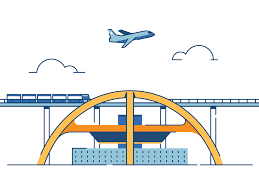
The Importance of Infrastructure in Today’s World
Infrastructure plays a crucial role in supporting the functioning of societies and economies around the world. From transportation networks to communication systems, infrastructure forms the backbone of modern civilization.
One key aspect of infrastructure is its role in facilitating economic development. Well-developed infrastructure, such as roads, bridges, and ports, enables the efficient movement of goods and services, contributing to economic growth and prosperity. In addition, infrastructure projects create jobs and stimulate investment in local communities.
Infrastructure also plays a vital role in ensuring public safety and security. Robust infrastructure systems, including water supply networks, power grids, and emergency services, help protect communities from natural disasters and other emergencies.
Furthermore, infrastructure is essential for enhancing quality of life. Access to reliable utilities such as electricity and clean water improves health outcomes and overall well-being. Modern infrastructure also includes digital networks that connect people globally, enabling communication and collaboration on an unprecedented scale.
As we look to the future, investing in sustainable infrastructure will be crucial for addressing challenges such as climate change and urbanization. Green infrastructure initiatives can help reduce carbon emissions and build resilience to environmental threats.
In conclusion, infrastructure is the foundation upon which modern society is built. By investing in robust and sustainable infrastructure systems, we can create a more prosperous, secure, and interconnected world for future generations.
Understanding Infrastructure: Definitions, Types, and Terminology Explained
- What is a better word for infrastructure?
- What are 3 different types of infrastructure?
- What do mean by infrastructure?
- What does infrastructure mean for dummies?
- What is a good definition of infrastructure?
- What is another word for infrastructure?
What is a better word for infrastructure?
When seeking an alternative term for “infrastructure,” one may consider using the term “framework.” This word conveys the idea of a structured system that supports various functions and activities within a particular context. Just like infrastructure, a framework provides the essential structure and support necessary for operations to run smoothly and efficiently. By using the term “framework,” individuals can emphasize the organized and foundational nature of the systems and resources that underpin society’s functioning.
What are 3 different types of infrastructure?
Infrastructure can be broadly categorized into three main types: transportation infrastructure, communication infrastructure, and energy infrastructure. Transportation infrastructure includes roads, bridges, airports, and public transit systems that facilitate the movement of people and goods. Communication infrastructure encompasses telecommunications networks, internet services, and data centers that enable the exchange of information globally. Energy infrastructure involves power plants, electrical grids, and renewable energy sources that provide essential electricity for homes, businesses, and industries. Each type of infrastructure plays a vital role in supporting the functioning of society and driving economic development.
What do mean by infrastructure?
Infrastructure refers to the fundamental physical and organizational structures and facilities needed for the operation of a society or enterprise. It encompasses a wide range of systems and services, including transportation networks, communication systems, water and sanitation facilities, energy grids, and public institutions. Essentially, infrastructure forms the backbone of modern civilization, providing the essential framework that supports economic development, public safety, and quality of life. Understanding the concept of infrastructure is crucial for recognizing its significance in shaping our daily lives and ensuring the smooth functioning of societies around the world.
What does infrastructure mean for dummies?
Infrastructure, in simple terms, refers to the fundamental physical and organizational structures and facilities needed for the functioning of a society or system. It includes essential elements like roads, bridges, buildings, utilities (such as water and power supply), and communication networks that support daily activities and enable economic growth. Essentially, infrastructure is the backbone that keeps our cities running smoothly and allows us to live our lives comfortably and efficiently.
What is a good definition of infrastructure?
Infrastructure can be defined as the fundamental physical and organizational structures and facilities needed for the operation of a society or enterprise. It encompasses a wide range of systems and services, including transportation networks, utilities such as water and electricity, communication systems, and public institutions like schools and hospitals. Essentially, infrastructure forms the backbone of a functioning society, enabling economic activity, ensuring public safety, and enhancing overall quality of life for its inhabitants.
What is another word for infrastructure?
Another term often used interchangeably with “infrastructure” is “public works.” Public works refer to the basic physical and organizational structures and facilities needed for the operation of a society, including transportation systems, utilities, and public buildings. This term highlights the communal nature of infrastructure and its essential role in supporting the functioning of communities and economies.
